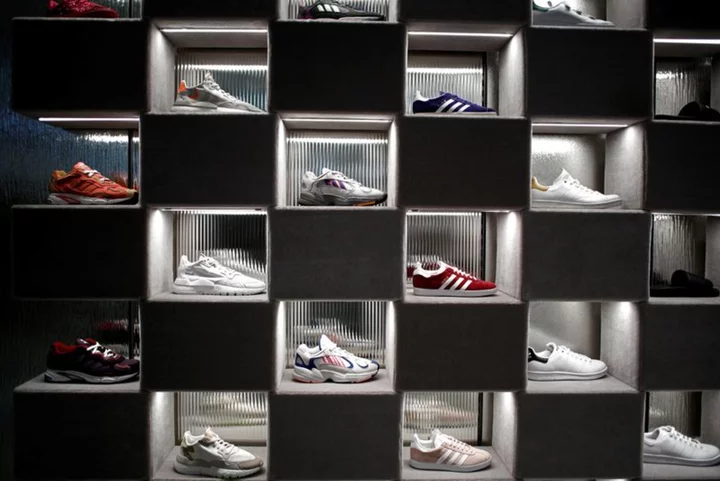By Helen Reid and Linda Pasquini
LONDON The trend for low-rise rubber-soled "terrace" sneakers could give Adidas and Puma an advantage over Nike this summer, but may not offset weakening U.S. and Chinese demand.
German sportswear giants Adidas and Puma have trawled their archives to re-release old styles in new colours, driving renewed interest in the shoes from the 1970s and 1980s named after the standing section at soccer stadiums.
The number of searches for "Adidas Samba", one of the brand's main terrace styles, has surged worldwide over the past year and hit a peak in mid-June, Google Trends data shows.
Puma is likely to benefit less from the trend than Adidas because its terrace range doesn't have as much name recognition, said Adam Cochrane, analyst at Deutsche Bank. But it's certainly an area where the brand can compete.
"If there's a loser from this it's Nike, which doesn't have the track record from the 80s so you don't have the historic shoes to fall back on and the back catalogue to revisit," he said. Nike is more known for chunky basketball shoes, like the hugely successful Jordan range.
Still, while terrace shoe sales are growing, they're a small fraction of the overall business. Investors will be pushing Puma and Adidas on broader strategies to navigate weak consumer demand at second-quarter results on July 26 and Aug. 3 respectively.
"We believe the U.S. market is now (following on from China) at the heart of the worries for investors in Adidas and Puma," said Robert Schramm-Fuchs, portfolio manager at Janus Henderson, which holds shares in Adidas.
Nike last month reported its slowest sales growth in four quarters in North America, its biggest market, highlighting a weaker than expected U.S. consumer. Weak GDP figures from China last week also raised alarm about the world's second-biggest economy.
Adidas, however, has got a big boost from selling some of its stock of discontinued Yeezy shoes. On Monday it slashed its expected 2023 operating loss to 450 million euros from 700 million euros, citing unexpectedly strong Yeezy sales.
Adidas, led by ex-Puma CEO Bjorn Gulden since the start of the year, said in May it would donate proceeds from Yeezy stock sales to non-governmental organisations including the Anti-Defamation League but has not yet said what share of the proceeds will go to NGOs.
Puma, whose shares have lagged Nike and Adidas over the past year, should update investors on strategy as the brand aims to up its game in performance sportswear after what some saw as an over-emphasis on lifestyle.
Sportswear has the potential to grow further with a "casualisation" of fashion and consumers' increased focus on health and fitness, said Edouard Aubin, analyst at Morgan Stanley.
"However, the cost to compete for sportswear brands is very high, and barriers to entry are low, making retailers quite vulnerable to 'boom and bust' cycles as trends change," said Aubin.
($1 = 0.9028 euros)
(Reporting by Helen Reid in London and Linda Pasquini in Gdansk; Editing by Susan Fenton)

